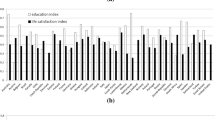Abstract
Designing well-being policies often requires the use of qualitative data. In fact many dimensions of well-being have to be appraised through the use of an ordered status: that is the case with health, happiness and educational attainments. While it is important to look at the mean levels achieved by society, distributional features are also salient aspects for any evaluation exercises, as it is likely that strong disparities in achievements among the population will prevail in those dimensions. Nonetheless, standards tools for inequality analysis, essentially mean-based and thus scale-dependent, are not applicable in this context, as any choice of scale in an ordinal framework is likely to be arbitrary and subject to change. Relying on the median-based approach developed by Allison and Foster (J Health Econ 23:505–524, 2004) for the measurement of self-reported health status inequality, this paper applies scale-invariant measures to subjective well-being and educational attainments in OECD countries using the 2010 round of the Gallup World Poll. This scale-invariant approach, applied to the case of three-category ordinal variables with identical median states, generates an unambiguous inequality and welfare ordering. This ranking is further completed by the computation of a scale-invariant inequality index. Both these measures aim to provide a robust picture of inequality and welfare in an ordinal context.







Similar content being viewed by others
Notes
Abul Naga and Yalcin (2010) have addressed this issue by identifying a class of inequality measures which can be used to make comparisons when the two distributions in question do not have the same median category.
To avoid limit conditions the standard Cantril Ladder has been preliminary re-parameterized by aggregating together the first three categories.
While in an ordinal context any re-scaling would be admissible, as the scale conveys no information, this is not the case for cardinal variables.
A methodological limitation of the class of indices developed by Abul Naga and Yalcin (2008), shared with the Allison and Foster ordering they are founded on, is that they are limited to situations in which medians coincide.
The extension of the framework to a multidimensional setting may be of particular importance for policy-makers, as there exists empirical evidence that poor education is often associated with low levels of life satisfaction.
References
Abul Naga, R. H., & Yalcin, T. (2008). Inequality measurement for ordered response health data. Journal of Health Economics, 27, 1614–1625.
Abul Naga, R. H., & Yalcin, T. (2010). Median independent inequality orderings. University of Aberdeen Business School working paper series (Vol. 03, pp. 1–25). Aberdeen: University of Aberdeen Business School.
Allison, R. A., & Foster, J. E. (2004). Measuring health inequality using qualitative data. Journal of Health Economics, 23, 505–524.
Atkinson, A. B., & Bourguignon, F. (1982). The comparison of multi-dimensioned distributions of economic status. Review of Economic Studies, 49, 183–201.
Blackorby, C., Primont, D., & Russell, D. (1978). Separability and functional structure: Theory and economic applications. New York: North-Holland.
Diener, E., Diener, M., & Diener, C. (1995). Factors predicting the subjective well-being of nations. Journal of Personality and Social Psychology, 69, 851–864.
Ferrer-i-Carbonell, A., & Frjiters, P. (2004). How important is methodology for the estimates of the determinants of happiness? The Economic Journal, 114, 641–659.
Foster, J. E., & Shorrocks, A. F. (1988). Poverty orderings. Econometrica, 56, 173–177.
Graham, C., & Felton, A. (2006). Inequality and happiness: Insights from Latin America. Journal of Economic Inequality, 4, 107–122.
Jacoby, J., & Matell, M. S. (1971). Three-point likert scales are good enough. Journal of Marketing Research, 8, 495–500.
Kalmijn, Y.-K., & Veenhoven, R. (2005). Measuring inequality of happiness in nations. In search of proper statistics. Journal of Happiness Studies, 6, 351–355.
Kroh, M. (2007). Measuring left-right political orientation: The choice of response format. Public Opinion Quarterly, 71, 204–220.
OECD. (2011). How’s life?. Measuring Well-Being: OECD Publishing, Paris.
Rothschild, M., & Stiglitz, J. E. (1970). Increasing risk I: A definition. Journal of Economic Theory, 2, 243–255.
Sen, A., & Foster, J. E. (1997). On economic inequality. Oxford: Clarendon Press.
Stevens, S. S. (1946). On the theory of scales of measurement. Science, 103, 677–680.
Author information
Authors and Affiliations
Corresponding author
Additional information
This paper has benefited from comments on earlier drafts from Marco Mira D’Ercole and Conal Smith.
Rights and permissions
About this article
Cite this article
Balestra, C., Ruiz, N. Scale-Invariant Measurement of Inequality and Welfare in Ordinal Achievements: An Application to Subjective Well-Being and Education in OECD Countries. Soc Indic Res 123, 479–500 (2015). https://doi.org/10.1007/s11205-014-0751-2
Accepted:
Published:
Issue Date:
DOI: https://doi.org/10.1007/s11205-014-0751-2




